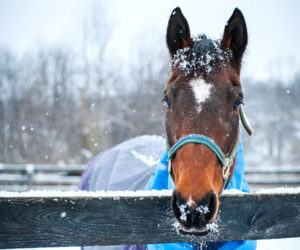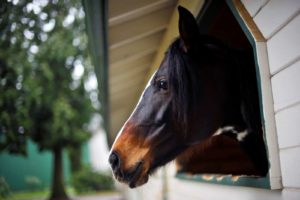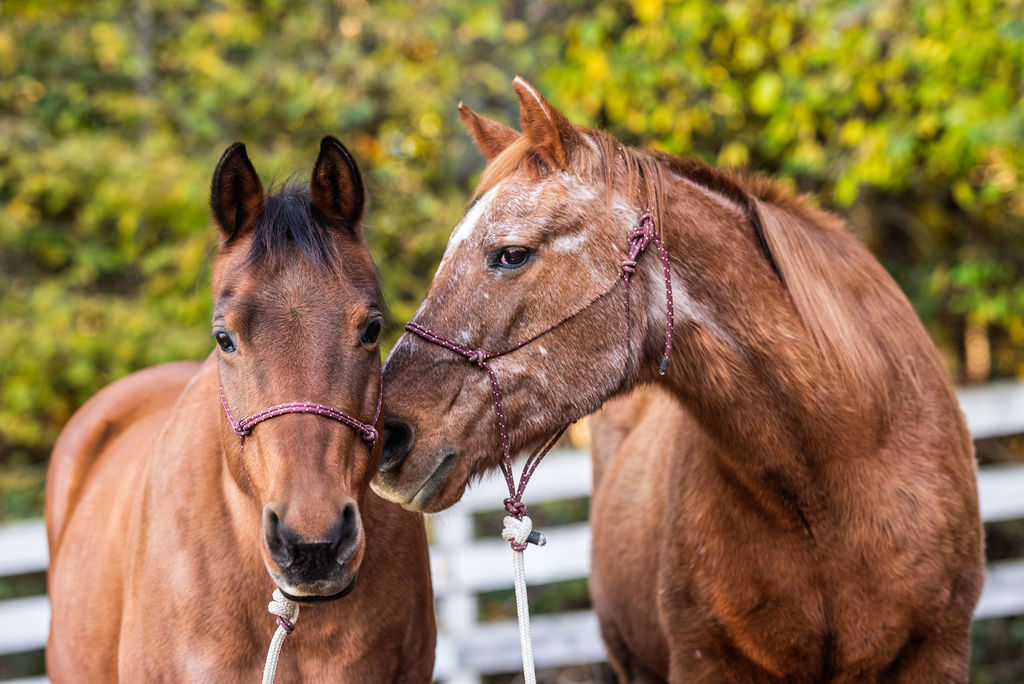
02 Mar 2021 Feeding the Senior Horse
As horses age, their health and dietary needs become increasingly complex. But by staying alert for changes and being proactive, many senior horses can thrive well past their thirties. Noticing issues early on is key for feeding older horses.
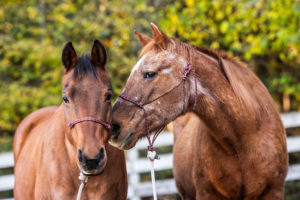 Signs of Aging
Signs of Aging
– Weight loss and dull coat
– Tooth wear/loss
– Lower appetite and vigor
– Arthritis-related lameness
– Protruding withers and spine
– Graying hair around ears, eyes, and forehead
Other problems may need a vet’s help to detect, such as
– Anemia
– Increased blood sugar
– Pituitary and/or thyroid dysfunction
– Kidney, liver or respiratory failure
Yearly vet checks with blood panels and lameness exams should be done on older horses to keep up to date on any changes in their body. Owners of elderly horses should also be on top of parasite management, dental care, and nutrition. You should also manage the environment your horse lives in so that they don’t have to fight with other horses over food and can live peacefully.
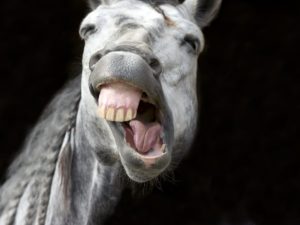 Dental health
Dental health
Older horses often have difficulties chewing and swallowing their food, and may need support from us to make their food more accessible. Dental disease and/or loss of teeth can cause chewing to become difficult and even ineffective.
Problems with the incisors can make it harder for horses to bite through grass in the pasture. Worn down molars have less grinding surface, and this could make it impossible for senior horses to break down food so they can swallow comfortably.
You might notice this through “quidding,” which is when a horse gums their hay for a while and then spits out a chunk of mushy hay.
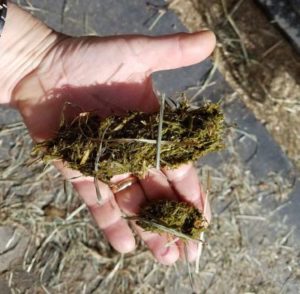
An example of Quidding in Horses
Dental issues can cause loss of appetite and choke. Any decrease in chewing decreases saliva production too, which protects your horse’s stomach. Without this, many senior horses are prone to ulcers and gastric pain.
Having your horse’s teeth checked every 6 months by a vet or specialized equine dentist will help manage or even prevent these problems.
Parasites
Seniors are often plagued by parasite damage or are not current on parasite control. This causes them to have more difficulty getting food to pass smoothly through the digestive system. A high parasite load can make horses less able to fight disease.
Intestinal parasites can scar and cause chronic damage in the intestines, which affects nutrient absorption.
Decreased Nutrient Absorption
Not only do senior horses often have issues chewing and swallowing food, but at the same time their digestive system is less able to absorb nutrients, especially fiber.
When older horses struggle to absorb certain nutrients like protein and phosphorus, it’s harder for them to repair soft tissue and bones. In the stomach, starch is less effectively digested which will change the acidity levels and could lead to colic or laminitis. In the hind gut, lowered vitamin production, such B vitamins, can compromise the immune system and make your senior horse more prone to illness.
It’s important that older horses are monitored carefully to make sure that they are getting enough nutrients to thrive. Because of older horse’s low metabolism, they need to be fed a higher density of nutrients than a younger horse.
Lifestyle Advice for Older Horses
As our horses grow older, they need more help from us to make sure their lives are peaceful and comfortable.
Senior horses should not be fed in group settings, where they have to compete for food with other horses. Arthritis makes them less mobile and less likely to get to food before the younger horses eat it, and pain from inflammation can cause loss of appetite entirely.
Older horses also have a harder time maintaining their internal temperature and it’s harder for them to handle rapid changes in weather. Protect your horse from the elements using shelters or blanketing, and providing more access to hay to stay warm. In summer, senior horses need access to shade and/or fans to help them regulate heat. And anytime there’s a rapid change in temperature, monitor your horse’s water intake.
Feeding the Senior Horse
There are Five main guidelines for feeding older horses.
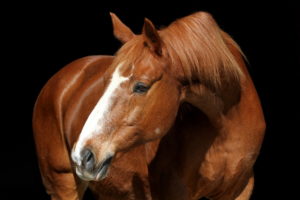 1. Roughage is the most vital part of the equine diet. Older horses do better on fresh green grass than roughage from hay only. Even with poor dental health, the grass tends to move well and get digested more easily.
1. Roughage is the most vital part of the equine diet. Older horses do better on fresh green grass than roughage from hay only. Even with poor dental health, the grass tends to move well and get digested more easily.
But when grass is limited or unavailable, there are two other substitutes for roughage – soaked hay cubes and beet pulp. Soaked hay cubes or pellets provide a softer texture which is easier to chew, and are more consistent in their nutrient contents than hay bales. Sugar free beet pulp is an excellent source of fiber and calcium, and provides additional water intake.
2. A yeast supplement can often be helpful to increase the bacterial functioning in the hind gut. This helps older horses digest and absorb nutrients more efficiently.
3. Adding salt to the diet is essential for multiple functions of the body – 4 tablespoons, or 2 ounces a day are a minimum and it will greatly encourage the horse to drink and stay hydrated. Often older horses struggle with constipation. Being more hydrated and consuming enough fiber helps them be more regular.
4. Older horses also need plenty of mineral nutrition and added dietary fat in the form of natural oils or rice bran, depending on their metabolic health. There are many brands out there, but the ones I’ve found to be the best are Medicine Bag and Wild Gold.
5. Ground flax is a source of both fiber and fat, which is particularly important to older horses. Anti-inflammatory omega-3 fatty acids are especially beneficial.
Feeding the Overweight Senior Horse
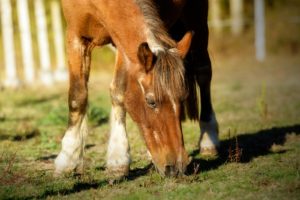 Excess weight or obesity in a horse often points to metabolic changes such as Cushing’s or thyroid issues. A vet will help you determine the exact underlying problem, and will often recommend a yearly blood panel to keep track of changes.
Excess weight or obesity in a horse often points to metabolic changes such as Cushing’s or thyroid issues. A vet will help you determine the exact underlying problem, and will often recommend a yearly blood panel to keep track of changes.
Returning the horse to a healthy weight after such a metabolic change can be delicate, so consult with an equine nutritionist to develop a science-based weight loss plan. Such plans usually involve reducing and slowing down feed intake, perhaps by using slow feed hay nets, and creating a balanced diet without concentrated feeds.
Often, a gently increasing workout plan is created too. This could be in-hand or under saddle. You can encourage your horses to move more between workouts by adding additional turnout time, and using stall toys to prevent boredom between feedings.
Feeding the Underweight Senior Horse
The first step is to consult your veterinarian to check dental health, parasite problems, and your horse’s liver and kidney function.
Second, evaluate the environment your senior is living in. Is there ample forage available? Has the herd changed or has your senior horse lost their position in the pecking order? Is the horse able to move around freely to avoid inflammation from arthritis? Make changes as needed.
Helping a senior horse gain weight can be an uphill battle. Hard keepers need good quality forage, which is not too coarse and includes a large portion of legume hay such as alfalfa.
If your horse’s liver is functioning well, as determined by a vet, high calorie options such as oils can be good resources for you. Cold pressed oils like coconut-hemp oil or Camelina oil are great options. They provide a well-balanced combination of fats and high calories without the bulk of a large meal.
Rice bran can be a good source of fat and fiber when liver disfunction is present. However, the high starch it contains may not be suitable if the horse is prone to Cushing’s or laminitis. It’s important to balance the high levels of phosphorus in rice bran with more calcium.
Adding a natural anti-inflammatory element such as ground stabilized flax or turmeric can help reduce swelling throughout the body and joints and provide pain relief to the senior horse.
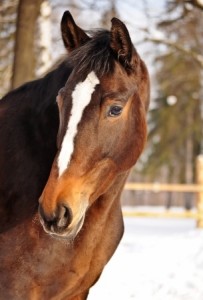 Summary
Summary
Dietary needs get more complex as age-related issues and illnesses come into play. As your horse grows older, you’ll need to consult with your vet and nutritionist more frequently to make sure that your older horse has everything they need to thrive.
In summary, just because a horse is getting old does not mean it has to be thin or in poor health. By staying on top of parasite control, dental care, joint health, and nutrition, even senior horses are able to maintain excellent weight and health well into their thirties!
